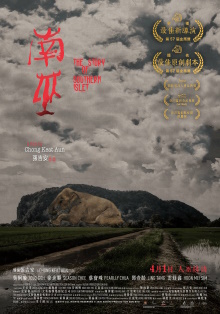After years of not watching a single Malaysian film, I suppose I’m picking up the slack now. The Story of Southern Islet is still really not that well known and this is director Chong Keat Aun’s first film. Nonetheless I believe it’s the best Malaysian film I’ve seen in a long time and is able to hold its own against the world’s best. Chong is actually a reasonably well-known figure in our local cultural circles but this is his first foray into directing. The result is an impressive debut that proves that he really does have the technical skills and artistic vision to have a promising career ahead of him.
Cheong and his family live in a village in Kedah, near the border of Thailand and Malaysia, in 1987. He makes a living selling dried shrimp at the local market and also sometimes catches fish in the paddy fields. One day he has an argument with a neighbor who later dies in a road accident. Soon afterwards Cheong falls sick, vomiting up nails and being too exhausted to work. Cheong is a superstitious man and thinks he has been cursed but his wife Yan comes from Johor Bahru and is skeptical of the local beliefs. As she struggles to support her two children and also take care of the bedridden Cheong, she is forced to come around when conventional medical treatment doesn’t seem to work. The other villagers introduce her to a shaman who might be able to help her and his instructions take her to the Mount Keriang which overlooks the countryside, and the spirit who may live there.
As many other critics have observed, this film appears to consciously channel the work of Apichatpong Weerasethakul. As far I’m concerned, this is great as I love the Thai director’s work and all good directors learn from those who have come before them. The film is enriched by drawing from the director’s own childhood and every frame of it oozes with authenticity down to small details like the radio and television spots of the period. The confluence of Chinese, Malay and Thai cultures makes for a rich subject matter especially as all three are downright obsessed with ghost stories. In the world Cheong has painted, just like that of Apichatpong, the supernatural is very real indeed and Yan denies its influence to no avail. The cinematography and mise-en-scène are far better than I would have expected of a first-time director and really sell the setting. I especially appreciate that the presence of the spirits and ghosts creates a creepy atmosphere, yet the film never tries to be a scary ghost movie. It’s a story of the character acknowledging the everyday reality of the supernatural and learning to deal with it as a practical matter.
Nonetheless, beautiful and sensitive as this portrayal is, it is in essence still “merely” a ghost story. This film exists to showcase traditional folklore and old superstitions that are in danger of being forgotten but it holds no ambitions beyond that. Apichatpong’s work however are masterpieces because they aim to be relevant even in our modern world. It’s not a matter of looking to the supernatural to solve problems. Instead he wants to convey how these stories and beliefs are part of the personal and collective identities of their people. At the same time, he uses them as metaphors for the malaise and alienation of modern life. While Chong’s film isn’t so sophisticated, I do believe it excels in ways only a fellow Malaysian might be able to appreciate. On the radio and on tv, the directives of government propaganda emphasizing how Malaysian society consists of three ethnicities living in harmony actually have the opposite effect. If it were true, it wouldn’t need to be repeated over and over again. A scene in school shows a student changing her name at the behest of her mother, apparently so as to qualify for government benefits set aside for particular groups. These small details stay in the background, unobtrusive and unremarked upon. Yet any Malaysian would recognize how authentic they are. Perhaps it is only by stealth that they bypassed the censors but their presence gives me hope that Chong might someday make the definitive Malaysian film that tackles these issues.
I admit that after being so badly disappointed by Barbarian Invasion, I was disinclined to look kindly on another critically praised Malaysian film that actually is good only when judged by lowered Malaysian standards. So I am very pleased to report that this is an excellent film by global standards with no caveats required at all. It really deserves greater attention and viewership from the global audience. Its theme is actually in opposition to my own values since I’m usually the skeptic in the room in any discussion about the supernatural and I’m not one to overly valorize nostalgia. Even so I can recognize skill and competent craftsmanship when I see it and it’s always gratifying to see a director so successfully execute a personal artistic vision. Highly recommended.
